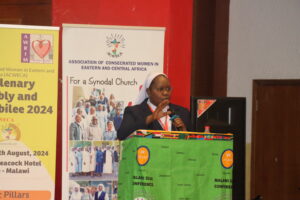AMECEA: CUEA Challenged to Look for Ways to Extend Capacity Building Project to Eritrea

The Catholic
University of Eastern Africa (CUEA) has been challenged to look for ways to
extend the Capacity Building Project of AMECEA in collaboration with the United
States Conference of Catholic Bishops (USCCB) so that it may also benefits the
Bishops Conference of Eritrea.
University of Eastern Africa (CUEA) has been challenged to look for ways to
extend the Capacity Building Project of AMECEA in collaboration with the United
States Conference of Catholic Bishops (USCCB) so that it may also benefits the
Bishops Conference of Eritrea.
Speaking to AMECEA Online News recently AMECEA
Secretary General, Rev. Fr Ferdinand Lugonzo said that so far, all AMECEA
Bishops Conferences have greatly benefited from the first phase of the project
except Eritrea.
Secretary General, Rev. Fr Ferdinand Lugonzo said that so far, all AMECEA
Bishops Conferences have greatly benefited from the first phase of the project
except Eritrea.
“Following
the recent evaluation of phase one of the Capacity Building Project in Addis
Ababa Ethiopia between 8th-9th October, AMECEA
Secretaries General together with the Vice Chancellors of the Catholic
Universities in the region suggested that efforts have to be made to reach out
to Eritrea through e-learning (distant learning) and CUEA was tasked with the
responsibility of looking into ways and modalities through which this can be
achieved,” he said.
the recent evaluation of phase one of the Capacity Building Project in Addis
Ababa Ethiopia between 8th-9th October, AMECEA
Secretaries General together with the Vice Chancellors of the Catholic
Universities in the region suggested that efforts have to be made to reach out
to Eritrea through e-learning (distant learning) and CUEA was tasked with the
responsibility of looking into ways and modalities through which this can be
achieved,” he said.
Fr. Lugonzo added
that during the evaluation they identified two major challenges to the project which
included the issue of looking for other sources of funding for the project and
lack of adequate accommodation facilities at the universities for participants.
“Finances for the project are not adequate hence the pace at which the project
is moving is very low in relation to the expectations of the Bishops. At the
same time, most of the Catholic Universities where the projects have been conducted
have no accommodation facilities for participants, hence a lot of money is
spent on accommodation elsewhere rather than at the university itself,” he
explained.
that during the evaluation they identified two major challenges to the project which
included the issue of looking for other sources of funding for the project and
lack of adequate accommodation facilities at the universities for participants.
“Finances for the project are not adequate hence the pace at which the project
is moving is very low in relation to the expectations of the Bishops. At the
same time, most of the Catholic Universities where the projects have been conducted
have no accommodation facilities for participants, hence a lot of money is
spent on accommodation elsewhere rather than at the university itself,” he
explained.
Fr. Lugonzo
said that the Secretaries General together with the Vice Chancellors proposed ownership
of the Capacity Building Project by the AMECEA Bishops as well as the
Universities in order to tackle the issue of inadequacy of funds; while also
have a proposed plan of involving more partners to support the project.
said that the Secretaries General together with the Vice Chancellors proposed ownership
of the Capacity Building Project by the AMECEA Bishops as well as the
Universities in order to tackle the issue of inadequacy of funds; while also
have a proposed plan of involving more partners to support the project.
Finally, according
to Fr Lugonzo, they emphasized on the need to develop an evaluation and
monitoring tool for the project at the grassroots level. This would assist in
understanding and analyzing the impact of the project as well as to clarify the
relationship between the Capacity Building Project activities and the desired
outcome.
to Fr Lugonzo, they emphasized on the need to develop an evaluation and
monitoring tool for the project at the grassroots level. This would assist in
understanding and analyzing the impact of the project as well as to clarify the
relationship between the Capacity Building Project activities and the desired
outcome.
The second
phase of the Capacity project is scheduled to take place between 2016 and 2018,
under the theme: “Family Apostolate, Youth Ministry and Chaplaincy”.
phase of the Capacity project is scheduled to take place between 2016 and 2018,
under the theme: “Family Apostolate, Youth Ministry and Chaplaincy”.
By Pamela Adinda, AMECEA Online
News
News


